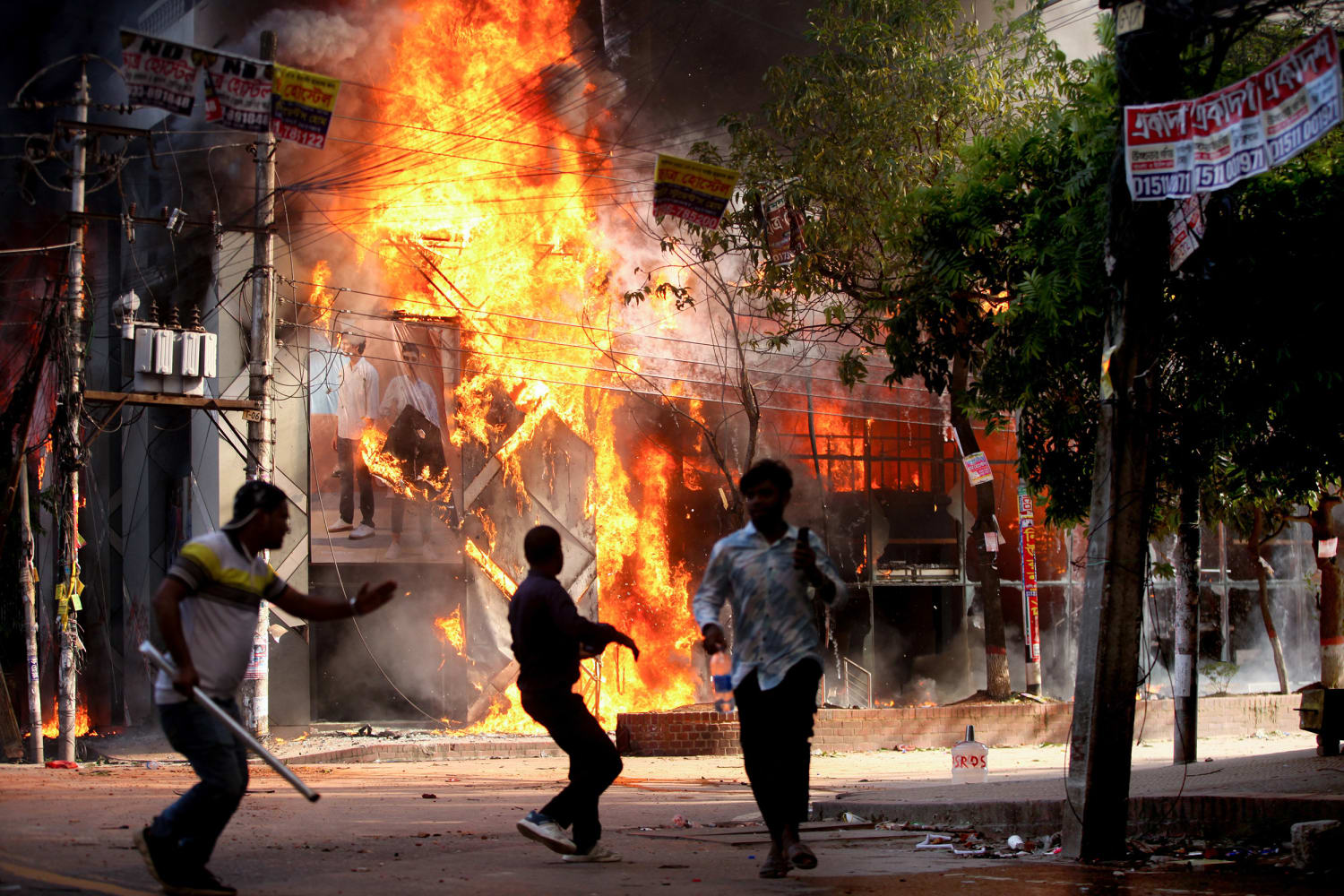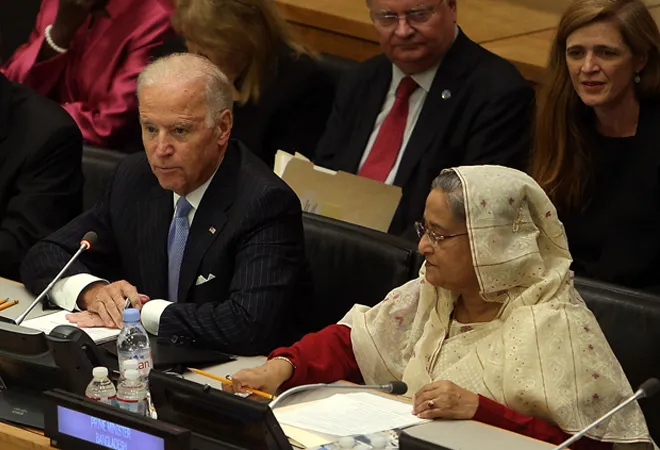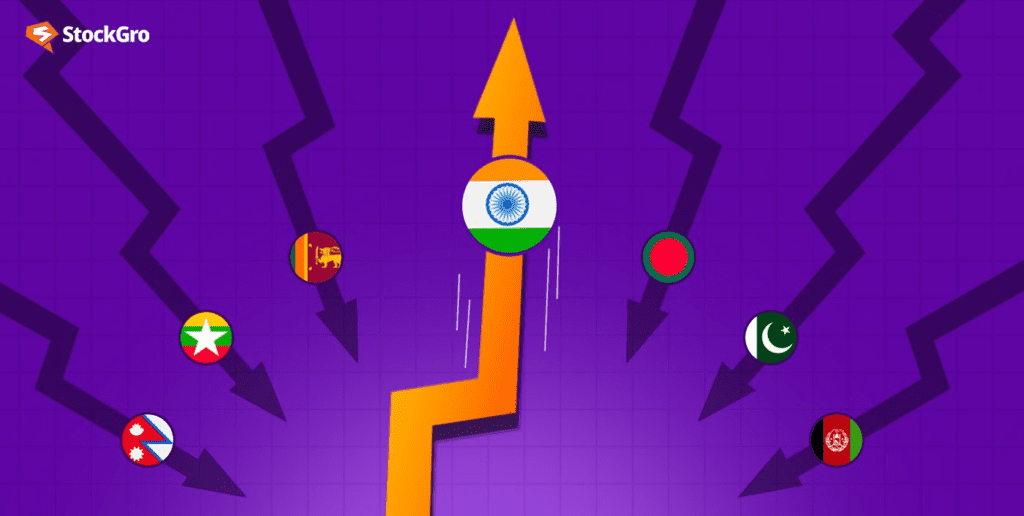Bangladesh’s Chaos And Sheikh Hasina’s Run To India Can Create Plenty Of Problems For India; Why Is A Foreign Hand Suspected In Burning Bangladesh?
Sheikh Hasina's resignation as Prime Minister and her departure from Bangladesh has introduced a new era of uncertainty for India. For over fifteen years, Hasina was a key ally for New Delhi, nourishing a strong bilateral relationship marked by significant advancements in trade, security cooperation, and people-to-people exchanges. However, her exit has cast doubt on these accomplishments and raised concerns about the future trajectory of Bangladesh's political arena, especially with the potential influence of Jamaat-e-Islami and an assertive China.

That Bangladesh has been on the boil for the last two months because of student protests against reserved quotas in government jobs, calling for Prime Minister Sheikh Hasina’s resignation, leading to clashes with security forces and supporters of the ruling party will probably come to an end now.
Bangladesh’s prime minister resigned and fled the country Monday and reached New Delhi with rumours that she is most likely headed to London.
After weeks of protests against a quota system for government jobs that descended into violence and grew into a broader challenge to her 15-year rule, thousands of demonstrators stormed her official residence and other buildings associated with her party and family.

The scenes are nothing short of astounding as people looted, some were seen obsceney showing her underclothing, many took their ire on her collection of sarees resorting to burning them and some were seen eating cooked food from the pantry!
These astounding clippings not only show the utter chaos that Bangladesh has descended into but some are even going as far as to ask, is Bangladesh the next Pakistan in the making?
Sheikh Hasina’s son and former official adviser, Sajeeb Wazed Joy, said the Former Prime Minister is done with Bangladesh.
Joy expressed deep concerns about the future of Bangladesh, warning that the country might descend into chaos and could become the next Pakistan.
He also feared that Hindus and Christians might be targeted. Joy conveyed his mother’s disappointment with the current situation, stating, “She is disappointed and disheartened, she fought militancy with iron hands, she is done. She is 77 years old.”
Joy also mentioned that the Prime Minister had planned to resign on August 3, but protesters opposed a peaceful transition of power.
As unrest escalated, Joy confirmed that his mother would not return to politics and had left the country for her safety.
Regarding the unrest, Joy suspected the involvement of Pakistan’s Inter-Services Intelligence (ISI) in provoking student unrest and aggravating the situation.
This escalated into a campaign to seek the ouster of Hasina, who had won a fourth straight term in January in an election boycotted by the main opposition Bangladesh Nationalist Party, which later called the elections a sham.
However, foreign observers from the US, Canada, Russia, the Organisation of Islamic Cooperation, and the Arab Parliament deemed the elections in Bangladesh free, fair, and peaceful, though a US State Department official stated they were not free or fair.

Many see a US hand behind the coup, as Hasina had troubled relations with the US in recent years. Just two months ago, after her return to power, Hasina claimed that a White country was conspiring against her.
Months after securing a fifth straight term for her government, Hasina claimed in May that she was offered a hassle-free re-election in the January 7 polls if she allowed a foreign country to build an air base in Bangladesh.
“If I allowed a certain country to build an air base in Bangladesh, then I would have had no problem,” she said, without naming the country but emphasizing that the “offer came from a White man.”
She added that this is why her Awami League party-led government is always in trouble, predicting more trouble but urging people not to worry.
When asked about her response to the offer, Hasina stated that she made the same reply as in 2001 when the US offered to sell the country’s gas to India.
“I’ve clearly said that I’m the daughter of Father of the Nation Bangabandhu Sheikh Mujibur Rahman. . . we won our Liberation War, I don’t want to come to power by renting part of the country or handing it over to some other country and I don’t need power,” she said. She emphasized that she would only stay in office if the people wanted.
Hasina had stated that she was battling on multiple fronts, both domestically and internationally, and that “conspiracies are still ongoing” to create a new country from parts of Bangladesh.
“Like East Timor…they will carve out a Christian country, taking parts of Bangladesh (Chattogram) and Myanmar with a base in the Bay of Bengal,” Hasina said, without providing further details.
She also mentioned that plots were being hatched to overthrow her government and that she might face the same fate as her father.

Hasina’s Troubled Relations with the US
Many believed Hasina was referring to the US, as she has had strained relations with the country for some time.
The US, the largest buyer of Bangladesh’s exports, had increased its calls for free and fair elections, imposing visa restrictions on members of Hasina’s ruling party and law enforcement officials in September.
“The US applied so much pressure on Bangladesh for free and fair elections, through both carrots and sticks, and for so long, yet to no avail,” said Michael Kugelman, director of the South Asia Institute at the Washington-based Wilson Centre, to Bloomberg in January.
“Consequently, there is a possibility that the administration could respond post-election with harsher steps.” He added that these measures could include “punitive actions in the space that would hurt Bangladesh the most,” specifically trade.
Two months ago, the US imposed sanctions on a former Bangladesh army chief, General (Retd) Aziz Ahmed, over alleged corruption, claiming his actions undermined the country’s democratic institutions and public trust.
In November last year, there were reports in Dhaka that politicians from the ruling party allegedly threatened US Ambassador Peter Haas over his perceived interference in the elections.
However, the State Minister denied these allegations, expressing confidence in the country’s ability to ensure the security of foreign diplomats like the ambassador.
A Russian Foreign Ministry spokesperson claimed that the US ambassador to Bangladesh and a senior representative of the local opposition discussed plans to organize mass anti-government protests during a meeting.
The spokesperson described the actions of the US ambassador as gross interference in the internal affairs of a sovereign state by “Washington and its satellites.” Washington, in turn, accused Moscow of deliberately mischaracterizing its foreign policy.

Uncertainties at India’s Doorstep
Sheikh Hasina’s resignation as Prime Minister and her departure from Bangladesh have introduced significant uncertainties for India.
For over fifteen years, Hasina was New Delhi’s strongest ally, and during her tenure, India-Bangladesh relations reached new highs; the bilateral relationship thrived with advancements in cross-border trade, transit arrangements, security cooperation, and people-to-people exchanges.
However, Hasina’s removal now casts a shadow over these achievements.
The protests leading to her exit also carried an anti-India sentiment, partly due to the perceived close ties between Hasina and New Delhi.
In this context, India faces several challenges –
For one, the Jamaat-e-Islami may have some influence over the interim government in Dhaka, as its supporters were reportedly involved in the protests against Hasina.
India’s relationship with Jamaat-e-Islami has been strained, as seen during the previous BNP-Jamaat government in Bangladesh.
Moreover, Jamaat-e-Islami’s influence could potentially pave the way for a greater Pakistani presence in Bangladeshi politics—something Hasina had effectively kept at bay. This shift could impact India’s border security with Bangladesh.
Secondly, China has been aggressively working to expand its influence in Bangladesh and has the financial means to support the post-Hasina government.
A strong Chinese presence in Bangladesh represents a significant challenge for India, potentially leaving it strategically encircled by unfriendly or indifferent neighbors– China and Pakistan to the west and north, a communist-led government in Nepal, Taliban-controlled Afghanistan to the far west, and an anti-India Maldives.
New Delhi’s strong support for Hasina over the past decade resulted in minimal engagement with Bangladeshi opposition groups, putting India in a difficult position now.
Hence, addressing the current anti-India sentiment in Bangladesh will require substantial diplomatic efforts to rebuild lost ground.
Bangladesh’s army chief, Waker-uz-Zaman, has assumed control and has so far made promising statements about forming an interim government with broad political support.
However, the specifics of this interim government and the timetable for new elections remain unclear; the uncertainty will keep New Delhi guessing.
The nature of the interim government will significantly influence Bangladesh’s political direction and, by extension, its relationship with India. New Delhi needs to act swiftly to establish connections with the new regime.
The Last Bit, With the departure of Sheikh Hasina, has left India struggling with significant uncertainties.
The potential rise of Jamaat-e-Islami and increased Chinese influence in Bangladesh pose substantial challenges for New Delhi; hence with minimal previous engagement with opposition groups and a fraught diplomatic position, India must balance these shifting dynamics carefully.
Therefore, building strong connections with the new interim government and addressing the current anti-India sentiment will be crucial for India to safeguard its interests and maintain stability in the region.




